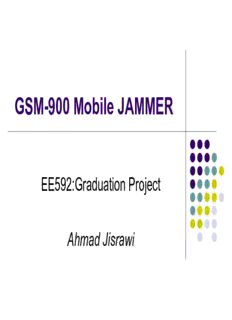
Presentation of the Ahmad Jisrawi GSM Jammer Project PDF
Preview Presentation of the Ahmad Jisrawi GSM Jammer Project
GSM-900 Mobile JAMMER EE592:Graduation Project Ahmad Jisrawi INTRODUCTION JAMMING is the act of intentionally directing electromagnetic energy at a communication system to disrupt or prevent signal transmission. The GSM Jammer is a device that transmit signal on the same frequency at witch the GSM system operates, the jamming success when the mobile phones in the area where the jammer is located could’nt make or reciece call phones . JAMMING Techniques 1 Type “A”: JAMMERS Type ”B”: Intelligent Cellular Disablers Type “C”: Intelligent Beacon Disablers Type ”D”: Smart JAMMERS Type ”E”: Faraday Cage ( EMI Suppression Techniques) GSM JAMMING Requirement 1 Jamming is successful when the jamming signal denies the usability of the communications transmission. In digital communications, the usability is denied when the error rate of the transmission cannot be compensated by error correction. Usually a successful jamming attack requires that the jammer power is roughly equal to signal power at the receiver. The effects of jamming depend on the jamming-to-signal ratio (J/S), and the modulation scheme. GSM JAMMING Requirement 2 Jamming-to-Signal ratio is given by: J P G G R2 L B = j jr rj tr r r S P G G R2 L B t tr rt jr j j Where: Pj = jammer power Pt = transmitter power Gjr = antenna gain (jammer to receiver) Grj = antenna gain (receiver to Jammer) Gtr = antenna gain (transmitter to receiver) Grt = antenna gain (receiver to transmitter) Br = communications receiver bandwidth Bj = jamming transmitter bandwidth Rtr = range between communications transmitter and receiver Rjt = range between jammer and communications receiver Lj = jammer signal loss (including polarization mismatch) Lr = communication signal loss GSM JAMMING Requirement 3 The frequency of the transmitted signal of the jammer must cover the GSM frequency range Uplink Downlink GSM 900 890-915 MHz 935-960 MHz As the power received from the GSM Base Station is usually low, It is easier to jamm the downlink (i.e. Jamming the mobile station 'handset' receiver) than uplink, hence the jammer output frequency should cover the downlink frequency. Design and Implementation GSM Mobile JAMMER Power IF RF Supply Section Section 5, 9,-9 V Block diagram of the mobile Jammer GSM-900 Mobile Jammer RF-Section 1 The RF-section is responsible for generating and transmitting the RF-Jamming signal. The main parts are: VCO, Power Amplifier, and the Antenna. fortunately, all the parts used are internally matched to 50ohm load, and hence transmission lines used are microstrip lines designed to have 50ohm characteristic impedance The components used are all surface mount component GSM-900 Mobile Jammer RF-Section 2 The output power of the jammer was designed so that it has a range of 20m, and was calculated as follow: Jr ( jammer power at mobile receiver) ≥ Smax – SNRmin SNRmin = 9 dB for mobile receiver and Smax = -15dBm (Mobile station signal power at mobile receiver) Jr ≥ -24 dBm The jammer output power = Jr + F free space path loss equation: F = 32.45 + 20 log (f *D), f in MHZ and D in Km Output power = 58 – 24 = 34 dBm GSM-900 Mobile Jammer RF-Section 3 The VCO 1 The MAX2623 VCO from MAXIM IC was used to generate the required signal The output frequency range for the VCO is: 850 – 1000 MHz for a tune voltage from 0.4 – 2.6V. The input tune frequency best suited the VCO was 120KHz to sweep the desired frequency range.
Description: